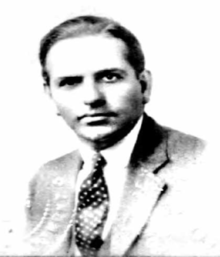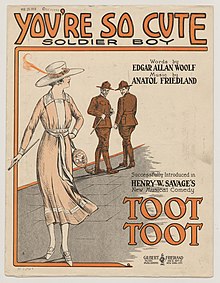| Anatole Friedland | |
|---|---|
 Friedland in 1922 Friedland in 1922 | |
| Born | (1881-03-21)March 21, 1881 St. Petersburg, Russia |
| Died | July 24, 1938(1938-07-24) (aged 50) Atlantic City, New Jersey |
| Nationality | Russian |
| Other names | Anatol Friedland, Anato Friedland |
| Occupation(s) | Composer, Vaudeville performer, Broadway producer |
| Years active | 1911-1936 |
Anatole Friedland, also spelled as Anatol Friedland and Anato Friedland, (March 21, 1881 – July 24, 1938) was a composer, songwriter, vaudeville performer, and Broadway producer during the 1900s. He is most-known for composing songs with lyricist L. Wolfe Gilbert. Their most popular songs include, "My Sweet Adair" (1915), "Are You From Heaven?" (1917), and "My Own Iona" (1916).
Personal life
Friedland was born on March 21, in St. Petersburg, Russia. Some sources claim his year of birth is 1881, while others list it as 1888. He used March 21, 1884 on his June 21, 1922 passport application.
Friedland's early education came from private schools in St. Petersburg. He then studied music at the Moscow Conservatory before emigrating to the United States sometime after 1900. He attended the Columbia Graduate School of Architecture, Planning and Preservation at Columbia University in New York City, where he studied architecture. While a student at Columbia, Friedland composed music for several varsity shows.
In 1936, Friedland had one of his legs amputated. Shortly after that, he retired and resided at The Ritz-Carlton Hotel in Atlantic City, New Jersey. Friedland died on July 24, 1938. His daughter, Gloria Greer, was eight years old at the time of his death. She would go on to become a reporter, editor, and talk show hostess. His widow was Rollie Friedland, later known as Rollie Landers. She founded Sand-to-Sea magazine.
Career

After graduating, Friedland worked as an architect by day and composed music at night. As an architect, he earned $16 per week. He soon drifted more towards vaudevilles.
In 1911, Friedland and lyricist Malvin Franklin wrote the score for the Broadway musical, The Wife Hunters. The musical starred Emma Carus and Lew Fields. Due to its success, Friedland was hired by the Shubert family to compose music for their Winter Garden productions, including The Passing Show. In 1912, he wrote the music for the Shubert hit, Broadway to Paris, which featured Gertrude Hoffmann, Louise Dresser, and Irène Bordoni. He also collaborated with Lee Shubert on musicals.
His song, "My Little Persian Rose," released in 1912, put him on the market.
Friedland met L. Wolfe Gilbert, a fellow Russian, in 1913. The two would go on to write many successful songs together, including a handful of World War I songs. Sometimes they would perform the songs on stage together. Other times Friedland would perform the songs alone, playing the piano and singing. They set up miniature revues which featured their songs. In the early 1930s, Friedland produced "tabloid" versions of Broadway musicals. These toured motion picture houses that showed one film feature and one live vaudeville. At the beginning of their careers, Barbara Stanwyck and Mae Clarke appeared in these vaudevilles. Friedland and Gilbert's first song issued by their own publishing firm was, Are You From Heaven?. The Gilbert & Friedland Publishing Company operated for a few successful years. Its business would decline after a five-and-ten-cent store ordered five million copies of one song (Afghanistan), but reversed the deal after the song failed to catch on.
In November 1919, Friedland returned to the publishing staff of Stern & Company, and was considered "one of the foremost writers of that organization."
Besides Gilbert, Friedland also collaborated with Harold R. Atteridge, and Edgar Allan Woolf. He also gave Phil Regan his start as a singer.
For most of his career, he worked as a vaudeville performer and was a headliner in musical productions. For two decades, Friedland appeared in or produced "lavish revues." One of these revues titled, Musicland (1919), starred Friedland and "a bevy of beautiful girls." At the time it was considered the most costly production in theatrical history, and included bizarre costumes, scenic effects, and thoughtful lyrics. These elaborate productions earned him the nickname, the "Ziegfeld of Vaudeville." Friedland headlined on the B. F. Keith Circuit in Anatol's Affairs of 1924.
During prohibition, Friedland opened and operated a speakeasy known as Club Anatole. Friedland performed many of his songs at this club, which was located on West 44th Street, between Sixth and Seventh Avenues in New York. Stanwyck, Clarke, and Dorothy Sheppard were hired to perform at the club. Friedland became protective of the three women and gave them advice on how to navigate Broadway and Tin Pan Alley.
In 1923, Friedland joined the American Society of Composers, Authors and Publishers.
Selected works

Lyrics by L. Wolfe Gilbert
- While You're Away (Pack Up Your Cares in a Bundle of Joy). (1918). Gilbert Friedland Music Publishers. OCLC 8342758
- While You're Away. (1918). Gilbert Friedland Music Publishers. OCLC 861077451
- Singapore. (1918). Gilbert & Friedland, Inc. OCLC 42917058
- (After the Battle is Over) Then You Can Come Back to Me. (1918). Gilbert & Friedland, Inc. OCLC 902638331
- Are You From Heaven?. (1917). Gilbert & Friedland. OCLC 9657464
- Camouflage. (1917). with E.E. Watson. J.W. Stern & Co.. OCLC 80540979
- Lily of the Valley, A "Nut" Song. (1917). J.W. Stern. OCLC 20119545
- Set Aside Your Tears (Till the Boys Come Marching Home). with Malvin Franklin. (1917). Joseph W. Stern & Co. OCLC 17799622
- Shades in the Night. (1916). J.W. Stern. OCLC 20120678
- My Own Iona. with Henry Burr, Manuel Romain, and Carey Morgan. (1916). Rex. OCLC 62472671
- My Sweet Adair. with Domenico Savino. (1915). Joseph W. Stern. OCLC 30124157
Lyrics by Edgar Allan Woolf
- You're So Cute, Soldier Boy. (1918). Gilbert & Friedland. OCLC 81692532
References
- ^ "Index of Composers and Artists: F". The Big Band Database Plus. Archived from the original on 2016-03-14. Retrieved 4 February 2016.
- ^ "The Composers of Early American Popular Music". The Parlor Songs Academy. Retrieved 4 February 2016.
- ^ Ewen, David (1962). Popular American Composers from Revolutionary Times to the Present. New York: H.W. Wilson Co. p. 65. ISBN 9780824200404.
- "Anatole Friedland passport application". United States Department of State. June 21, 1922. Retrieved 2016-08-01.
- ^ "Notes". A Global Report from Columbia University Graduate School of Architecture, Planning and Preservation. Columbia University Graduate School of Architecture, Planning and Preservation. 24 March 2011. Archived from the original on 25 February 2016. Retrieved 4 February 2016.
- "Anatol Friedland. Wrote Song Hits. Author of 'My Little Persian Rose,' 'Lily of the Valley' and Others Dies in Jersey. Once Ran Nightclub Here. Composed Music for Student Shows While at Columbia. Appeared in Vaudeville. Graduate of Columbia". The New York Times. July 25, 1938.
- ^ Fessier, Bruce (31 October 2015). "Longtime desert journalist Gloria Greer dies". The Desert Sun. Palm Springs. Retrieved 4 February 2016.
- Kilgallen, Dorothy (18 December 1943). "The $64 Questions". Pittsburgh Post-Gazette. Retrieved 5 February 2016.
- ^ Wilson, Victoria (2013). A Life of Barbara Stanwyck: Steel-True 1907-1940. Simon & Schuster. ISBN 9780684831688.
- ^ Music Trades. Vol. 58. New York: The Music Trades. 1 November 1919. p. 47.
- "My little Persian rose". Library of Congress: National Jukebox. Library of Congress. Retrieved 5 February 2016.
- ^ "Anatol Friedland". Media Bang. Retrieved 5 February 2016.
- While you're away:("Pack up your cares in a bundle of joy"). OCLC WorldCat. OCLC 8342758. Retrieved 5 February 2015.
- While you're away. OCLC WorldCat. OCLC 861077451. Retrieved 5 February 2016.
- "While you're away". Pritzker Military Museum & Library. Retrieved 5 February 2016.
- Vogel (1995) p. 278 "World War I Songs: A History and Dictionary of Popular American Patriotic Tunes, with Over 300 Complete Lyrics" (McFarland & Company, Inc.)
- Singapore. OCLC WorldCat. OCLC 42917058. Retrieved 4 February 2016.
- Then you can come back to me. OCLC WorldCat. OCLC 902638331. Retrieved 5 February 2016.
- Vogel (1995) pp. 147, 286. "World War I Songs: A History and Dictionary of Popular American Patriotic Tunes, with Over 300 Complete Lyrics (McFarland & Company, Inc.)
- "Then you can come back to me". Pritzker Military Museum & Library. Retrieved 5 February 2016.
- Are you from heaven?. OCLC WorldCat. OCLC 9657464. Retrieved 4 February 2016.
- Camouflage. OCLC WorldCat. OCLC 80540979. Retrieved 5 February 2016.
- Vogel (1995) p. 161 "World War I Songs: A History and Dictionary of Popular American Patriotic Tunes, with Over 300 Complete Lyrics (McFarland & Company, Inc.)
- Lily of the valley. OCLC WorldCat. OCLC 20119545. Retrieved 4 February 2016.
- Set aside your tears: (till the boys come marching home). OCLC WorldCat. OCLC 17799622. Retrieved 5 February 2016.
- Vogel (1995) p. 234-235 "World War I Songs: A History and Dictionary of Popular American Patriotic Tunes with Over 300 Complete Lyrics" (McFarland & Company, Inc.)
- "Set aside your tears (till the boys come marching home)". Pritzker Military Museum & Library. Retrieved 5 February 2016.
- Shades of night. OCLC WorldCat. OCLC 20120678. Retrieved 4 February 2016.
- My own iona. OCLC WorldCat. OCLC 62472671. Retrieved 4 February 2016.
- My sweet Adair. OCLC WorldCat. OCLC 30124157. Retrieved 4 February 2016.
- You're so cute: soldier boy. OCLC WorldCat. OCLC 81692532. Retrieved 5 February 2016.
- "You're so cute: soldier boy". OCLC WorldCat. Retrieved 5 February 2016.
- Vogel (1995) p. 283 "World War I Songs: A History and Dictionary of Popular American Patriotic Tunes, with Over 300 Complete Lyrics" (McFarland & Company, Inc.)
- Bibliography
- Wilson, Victoria (2013). A Life of Barbara Stanwyck: Steel-True 1907-1940. Simon & Schuster. ISBN 9780684831688.
- Vogel, Frederick G.. World War I Songs: A History and Dictionary of Popular American Patriotic Tunes, with Over 300 Complete Lyrics. Jefferson: McFarland & Company, Inc., 1995. ISBN 0-89950-952-5
External links
- Photo of Antaole Friedland at Victoria Wilson Books
- The Pittsburgh Press: Anatole Friedland leaves his dear New York for Pittsburgh
- New York Clipper: Review of Anatole Friedland's revue Anatole's Affair